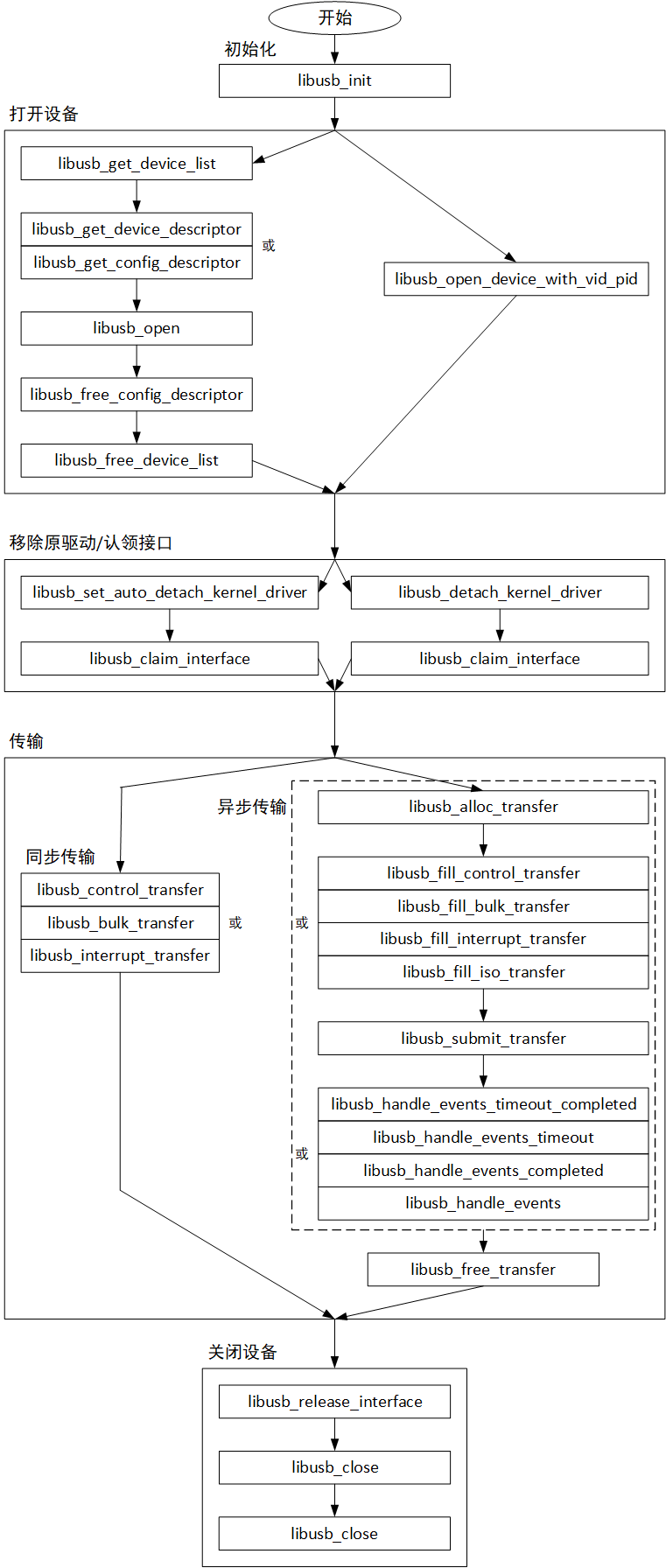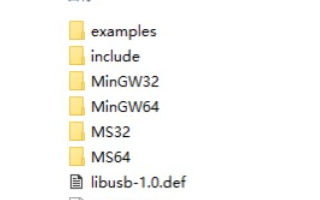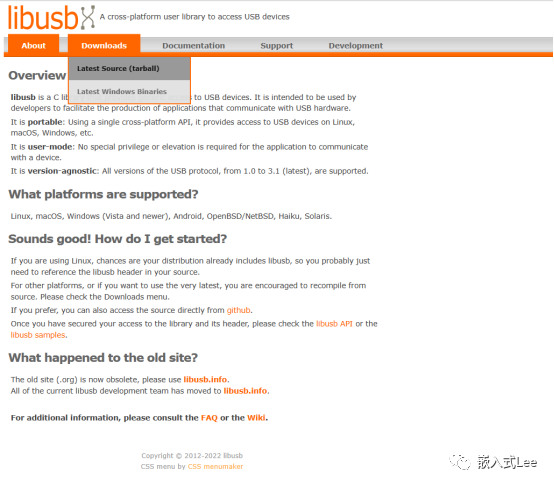1. 概述
1.1 介绍
libusb 是一个使用 C 编写的库,它提供 USB 设备的通用的访问方法。APP 通过它,可以方便地访问 USB 设备,无需编写 USB 设备驱动程序。
可移植性:支持 Linux、macOS、Windows、Android、OpenBSD 等
用户模式:APP 不需要特权模式、也不需要提升自己的权限即可访问 USB 设备
支持所有 USB 协议:从 1.0 到 3.1 都支持
libusb 支持所有的传输类型(控制/批量/中断/实时),有两类 API 接口:同步(Synchronous,简单),异步(Asynchronous,复杂但是更强大)。
它是轻量级的、线程安全的。还支持热拔插。
1.2 用法
可以通过 libusb 访问 USB 设备,不需要 USB 设备端的驱动程序,需要移除原来的驱动程序。然后就可以直接访问 USB 控制器的驱动程序,使用 open/read/write/ioctl/close 这些接口来打开设备、收发数据、关闭设备。
libusb 封装了更好用的函数,这些函数的使用可以分为 5 个步骤:
初始化
打开设备
移除原驱动/认领接口
传输
关闭设备

2. API 接口
2.1 分类
libusb 的接口函数分为两类:同步(Synchronous device I/O)、异步(Asynchronous device I/O)。
USB 数据传输分为两个步骤,对于读数据,先给设备发出数据的请求,一段时间后数据返回;对于写数据,先发送数据给设备,一段时间后得到回应。
同步接口的核心在于把上述两个步骤放在一个函数里面。比如想去读取一个 USB 键盘的数据,给键盘发出读请求后,如果用户一直没有按下键盘,那么读函数会一直等待。
异步接口的核心在于把上述两个步骤分开:使用一个非阻塞的函数启动传输,它会立刻返回;提供一个回调函数用来处理返回结果。
同步接口的示例代码如下,在libusb_bulk_transfer函数内部,如果没有数据则会休眠:
unsignedchardata[4]; intactual_length; intr=libusb_bulk_transfer(dev_handle,LIBUSB_ENDPOINT_IN,data,sizeof(data),&actual_length,0); if(r==0&&actual_length==sizeof(data)){ //接收到的数据保存在data数组里 //解析这些数据就可以知道按键状态 }else{ error(); }使用同步接口时,代码比较简单。但是无法实现"多 endpoint"的操作:上一个 endpoint 的传输在休眠,除非使用另一个线程,否则在同一个线程内部在等待期间是无法操作另一个 endpoint 的。还有另一个缺点:无法取消传输。
异步接口是在 libusb-1.0 引入的新性能,接口更复杂,但是功能更强大。在异步接口函数里,它启动传输、设置回调函数后就立刻返回。等"读到数据"或是"得到回应"后,回调函数被调用。发起数据传输的线程无需休眠等待结果,它支持"多endpoint"的操作,也支持取消传输。
2.2 初始化/反初始化
/**ingrouplibusb_lib *初始化libusb,这个函数必须先于其他libusb的函数执行 * *如果传入NULL,那么函数内部会穿件一个默认的context *如果已经创建过默认的context,这个context会被重新使用(不会重新初始化它) * *参数: *ctx:contextpointer的位置,也可以传入NULL *返回值 *0-成功 *负数-失败 */ intAPI_EXPORTEDlibusb_init(libusb_context**ctx);
初始化 libusb,参数是一个"a context pointer"的指针,如果这个参数为 NULL,则函数内部会创建一个"default context"。所谓"libusb context"就是 libusb 上下文,就是一个结构体,里面保存有各类信息,比如:libusb 的调试信息是否需要打印、各种互斥锁、各类链表(用来记录USB传输等等)。
程序退出前,调用如下函数:
/**ingrouplibusb_lib *发初始化libusb *在关闭usb设备(libusb_close)后、退出程序前调用此函数 * *参数: *ctx:context,传入NULL表示defaultcontext */ voidAPI_EXPORTEDlibusb_exit(libusb_context*ctx);
2.3 获取设备
可以使用libusb_get_device_list取出所有设备,函数接口如下:
/**@ingrouplibusb_dev *返回一个list,list里含有当前系统中所有的USB设备 * *我们一般会在list里寻找需要访问的设备,找到之后使用libusb_open函数打开它 *然后调用libusb_free_device_list释放list * *这个函数的返回值表示list中有多少个设备 *list的最后一项是NULL * *参数: *ctx:context *list:outputlocationforalistofdevices,最后必须调用libusb_free_device_list()来释放它 *返回值:list中设备的个数,或错误值 */ ssize_tAPI_EXPORTEDlibusb_get_device_list(libusb_context*ctx,libusb_device***list);
调用此函数后,所有设备的信息存入 list,然后遍历 list,找到想操作的设备。这个函数内部会分配 list 的空间,所以用完后要释放掉,使用以下函数释放:
/**ingrouplibusb_dev *前面使用libusb_get_device_list()获得了设备list, *使用完后要调用libusb_free_device_list()释放这个list *如果参数unref_devices为1,则list中每个设备的引用计数值减小1 *参数: *list:要释放的设备list *unref_devices:是否要将设备的引用计数减1 */ voidAPI_EXPORTEDlibusb_free_device_list(libusb_device**list,intunref_devices);
2.4 打开/关闭设备
使用 libusb_get_device_list 得到设备列表后,可以选择里面的某个设备,然后调用 libusb_open:
/**ingrouplibusb_dev *打开一个设备并得到它的句柄,以后进行IO操作时都是使用句柄 * *使用libusb_get_device()函数可以得到设备的list, *从list里确定你要访问的设备后, 使用libusb_open()去打开它。 * libusb_open()函数内部会增加此设备的引用计数, 使用完毕后要调用libusb_close()减小引用计数。 * *参数: *dev:要打开的设备 *dev_handle:输出参数,用来保存句柄 *返回值: *0-成功 *LIBUSB_ERROR_NO_MEM:缺少内存 *LIBUSB_ERROR_ACCESS:权限不足 *LIBUSB_ERROR_NO_DEVICE:这个设备未连接 *其他错误:其他LIBUSB_ERROR错误码 */ intAPI_EXPORTEDlibusb_open(libusb_device*dev,libusb_device_handle**dev_handle);
使用 libusb_open 函数打开 USB 设备后,可以得到一个句柄:libusb_device_handle。以后调用各种数据传输函数时,就是使用libusb_device_handle。
使用完毕后,调用 libusb_close 关闭设备,函数原型如下:
/**ingrouplibusb_dev *关闭设备句柄,在程序退出之前应该使用它去关闭已经打开的句柄 * *设备的引用计数在前面被libusb_open()函数增加了。 *在libusb_close()函数的内部,它会减小设备的引用计数。 * *参数:dev_handle-句柄 */ voidAPI_EXPORTEDlibusb_close(libusb_device_handle*dev_handle);
2.5 根据 ID 打开设备
如果知道设备的 VID、PID,那么可以使用 libusb_open_device_with_vid_pid 来找到它、打开它。这个函数的内部,先使用libusb_get_device_list列出所有设备,然后遍历它们根据 ID 选出设备,接着调用 libusb_open 打开它,最后调用 libusb_free_device_list 释放设备。
libusb_open_device_with_vid_pid 函数原型如下:
/**ingrouplibusb_dev *打开设备的常规做法是使用libusb_get_device_list()得到设备list, *然后遍历list,找到设备 *接着使用libusb_open()函数得到句柄 * *如果知道USB设备的VID、PID,那么可以使用libusb_open_device_with_vid_pid()函数快速打开它,得到句柄。 * *这个函数有一个缺点:如果系统中有多个ID相同的设备,你只能打开第1个设备 * *参数: *ctx:context,或者传入NULL以使用默认的context *vendor_id:厂家ID *product_id:产品ID * *返回值: *句柄-找到的第1个设备的句柄 *NULL-没有找到设备 */ DEFAULT_VISIBILITY libusb_device_handle*LIBUSB_CALLlibusb_open_device_with_vid_pid( libusb_context*ctx,uint16_tvendor_id,uint16_tproduct_id);
2.6 描述符相关函数
2.6.1 获得设备描述符
/**ingrouplibusb_desc *获得设备描述符 * *参数: *dev-哪个设备 *desc-输出参数,用来保存设备描述符 * *返回值: *0-成功,或其他LIBUSB_ERROR错误码 */ intAPI_EXPORTEDlibusb_get_device_descriptor(libusb_device*dev, structlibusb_device_descriptor*desc);
2.6.2 获得/释放配置描述符
/**ingrouplibusb_desc *获得指定的配置描述符 * *参数: *dev-哪个设备 *config_index-哪个配置 *config-输出参数,用来保存配置描述符,使用完毕要调用libusb_free_config_descriptor()释放掉 * *返回值: *0-成功 *LIBUSB_ERROR_NOT_FOUND-没有这个配置 *其他LIBUSB_ERROR错误码 */ intAPI_EXPORTEDlibusb_get_config_descriptor(libusb_device*dev, uint8_tconfig_index,structlibusb_config_descriptor**config); /**ingrouplibusb_desc *Freeaconfigurationdescriptorobtainedfrom *前面使用libusb_get_active_config_descriptor()或libusb_get_config_descriptor()获得配置描述符, *用完后调用libusb_free_config_descriptor()释放掉 */ voidAPI_EXPORTEDlibusb_free_config_descriptor( structlibusb_config_descriptor*config);
2.7 detach/attach 驱动
2.7.1 两种方法
使用 libusb 访问 USB 设备时,需要先移除(detach)设备原来的驱动程序,然后认领接口(claim interface)。有两种办法:
方法1:
//只是设置一个标记位表示libusb_claim_interface //使用libusb_claim_interface时会detach原来的驱动 libusb_set_auto_detach_kernel_driver(hdev,1); //标记这个interface已经被使用认领了 libusb_claim_interface(hdev,interface_number);
方法2:
//detach原来的驱动 libusb_detach_kernel_driver(hdev,interface_number); //标记这个interface已经被使用认领了 libusb_claim_interface(hdev,interface_number);
2.7.2 函数原型
函数libusb_detach_kernel_driver原型如下:
/**ingrouplibusb_dev *给USB设备的接口(interface)移除驱动程序.Ifsuccessful,youwillthenbe *移除原来的驱动后才能"claimtheinterface"、执行IO操作 * *实际上libusb会给这个接口安装一个特殊的内核驱动, *所以本函数"移除驱动"是移除其他驱动,不是移除这个特殊的驱动。 *若干这个接口已经安装了这个特殊的驱动,本函数会返回LIBUSB_ERROR_NOT_FOUND. * *参数: *dev_handle-设备句柄 *interface_number-哪一个接口 * *返回值: *0-成功 *LIBUSB_ERROR_NOT_FOUND-这个接口没有安装其他驱动 *LIBUSB_ERROR_INVALID_PARAM-没有这个接口 *LIBUSB_ERROR_NO_DEVICE-这个设备未连接 *LIBUSB_ERROR_NOT_SUPPORTED-系统不支持此操作,比如Windows *其他LIBUSB_ERROR错误码 */ intAPI_EXPORTEDlibusb_detach_kernel_driver(libusb_device_handle*dev_handle,intinterface_number);
函数libusb_claim_interface原型如下:
/**ingrouplibusb_dev *libusb使用内核里一个特殊的驱动程序, *libusb_claim_interface()函数就是给某个usb接口安装这个特殊的驱动程序, *在使用libusb的函数执行IO操作之前必须调用本函数。 * *你可以给"已经claim过的接口"再次调用本函数,它直接返回0。 * *如果这个接口的auto_detach_kernel_driver被设置为1, * libusb_claim_interface()函数会先移除其他驱动。 * *本函数时纯粹的逻辑操作:只是替换接口的驱动程序而已,不会导致USB硬件传输。 * *参数: *dev_handle-句柄,表示USB设备 *interface_number-接口 * *返回值: *0-成功 *LIBUSB_ERROR_NOT_FOUND-没有这个接口 *LIBUSB_ERROR_BUSY-其他APP或者驱动正在使用这个接口 *LIBUSB_ERROR_NO_DEVICE-设备未连接 *其他LIBUSB_ERROR错误码 */ intAPI_EXPORTEDlibusb_claim_interface(libusb_device_handle*dev_handle,intinterface_number);
使用完 USB 设备后,在调用 libusb_close 之前,应该libusb_release_interface释放接口:
/**ingrouplibusb_dev *前面使用libusb_claim_interface()给接口安装了给libusb使用的特殊驱动程序, *使用完毕后,在调用libusb_close()关闭句柄之前, *可以调用libusb_release_interface()卸载特殊驱动程序 *如果设备的auto_detach_kernel_driver为1,还会重新安装普通驱动程序 * *这是一个阻塞函数,它会给USB设备发送一个请求:SET_INTERFACEcontrol, *用来把接口的状态复位到第1个setting(thefirstalternatesetting) * *参数: *dev_handle-设备句柄 *interface_number-哪个接口 * *返回值: *0-成功 *LIBUSB_ERROR_NOT_FOUND-这个接口没有被claim(没有安装特殊的驱动程序) *LIBUSB_ERROR_NO_DEVICE-设备未连接 *其他LIBUSB_ERROR错误码 */ intAPI_EXPORTEDlibusb_release_interface(libusb_device_handle*dev_handle,intinterface_number);
2.8 同步传输函数
2.8.1 控制传输
/**ingrouplibusb_syncio *启动控制传输 * *传输方向在bmRequestType里 *wValue,wIndex和wLength是host-endian字节序 * *参数: *dev_handle-设备句柄 *bmRequestType-setup数据包的bmRequestType域 *bRequest-setup数据包的bRequest域 *wValue-setup数据包的wValue域 *wIndex-setup数据包的wIndex域 *data-保存数据的buffer,可以是in、out数据 *wLength-setup数据包的wLength域 *timeout-超时时间(单位ms),就是这个函数能等待的最大时间;0表示一直等待直到成功 * *返回值: *正整数-成功传输的数据的长度 *LIBUSB_ERROR_TIMEOUT-超时 *LIBUSB_ERROR_PIPE-设备不支持该请求 *LIBUSB_ERROR_NO_DEVICE-设备未连接 *LIBUSB_ERROR_BUSY-如果这个函数时在事件处理上下文(eventhandlingcontext)里则返回这个错误 *LIBUSB_ERROR_INVALID_PARAM-传输的字节超过OS或硬件的支持 *theoperatingsystemand/orhardwarecansupport(see efasynclimits) *其他LIBUSB_ERROR错误码 */ intAPI_EXPORTEDlibusb_control_transfer(libusb_device_handle*dev_handle, uint8_tbmRequestType,uint8_tbRequest,uint16_twValue,uint16_twIndex, unsignedchar*data,uint16_twLength,unsignedinttimeout);
2.8.2 批量传输
/**ingrouplibusb_syncio *启动批量传输 *传输方向在endpoint的"方向位"里表示 * *对于批量读,参数length表示"期望读到的数据最大长度",实际读到的长度保存在transferred参数里 * *对于批量写,transferred参数表示实际发送出去的数据长度 * *发生超时错误时,也应该检查transferred参数。 *libusb会根据硬件的特点把数据拆分为一小段一小段地发送出去, *这意味着发送满某段数据后可能就发生超时错误,需要根据transferred参数判断传输了多少数据。 * *参数: *dev_handle-设备句柄 *endpoint-端点 *data-保存数据的buffer,可以是in、out数据 *length-对于批量写,它表示要发送的数据长度;对于批量读,它表示"要读的数据的最大长度" *transferred-输出参数,表示实际传输的数据长度 *timeout-超时时间(单位ms),就是这个函数能等待的最大时间;0表示一直等待直到成功 * *返回值: *0-成功,根据transferred参数判断传输了多少长度的数据 *LIBUSB_ERROR_TIMEOUT-超时,根据transferred参数判断传输了多少长度的数据 *LIBUSB_ERROR_PIPE-端点错误,端点被挂起了 *LIBUSB_ERROR_OVERFLOW-溢出,设备提供的数据太多了 *LIBUSB_ERROR_NO_DEVICE-设备未连接 *LIBUSB_ERROR_BUSY-如果这个函数时在事件处理上下文(eventhandlingcontext)里则返回这个错误 *LIBUSB_ERROR_INVALID_PARAM-传输的字节超过OS或硬件的支持 *其他LIBUSB_ERROR错误码 */ intAPI_EXPORTEDlibusb_bulk_transfer(libusb_device_handle*dev_handle, unsignedcharendpoint,unsignedchar*data,intlength, int*transferred,unsignedinttimeout);
2.8.3 中断传输
/**ingrouplibusb_syncio *启动中断传输 *传输方向在endpoint的"方向位"里表示 * *对于中断读,参数length表示"期望读到的数据最大长度",实际读到的长度保存在transferred参数里 * *对于中断写, transferred参数表示实际发送出去的数据长度,不一定能发送完全部数据。 * *发生超时错误时,也应该检查transferred参数。 *libusb会根据硬件的特点把数据拆分为一小段一小段地发送出去, *这意味着发送满某段数据后可能就发生超时错误,需要根据transferred参数判断传输了多少数据。 * *参数: *dev_handle-设备句柄 *endpoint-端点 *data-保存数据的buffer,可以是in、out数据 *length-对于批量写,它表示要发送的数据长度;对于批量读,它表示"要读的数据的最大长度" *transferred-输出参数,表示实际传输的数据长度 *timeout-超时时间(单位ms),就是这个函数能等待的最大时间;0表示一直等待直到成功 * *返回值: *0-成功,根据transferred参数判断传输了多少长度的数据 *LIBUSB_ERROR_TIMEOUT-超时,根据transferred参数判断传输了多少长度的数据 *LIBUSB_ERROR_PIPE-端点错误,端点被挂起了 *LIBUSB_ERROR_OVERFLOW-溢出,设备提供的数据太多了 *LIBUSB_ERROR_NO_DEVICE-设备未连接 *LIBUSB_ERROR_BUSY-如果这个函数时在事件处理上下文(eventhandlingcontext)里则返回这个错误 *LIBUSB_ERROR_INVALID_PARAM-传输的字节超过OS或硬件的支持 *其他LIBUSB_ERROR错误码 */ intAPI_EXPORTEDlibusb_interrupt_transfer(libusb_device_handle*dev_handle, unsignedcharendpoint,unsignedchar*data,intlength, int*transferred,unsignedinttimeout);
2.9 异步传输函数
2.9.1 使用步骤
使用 libusb 的异步函数时,有如下步骤:
分配:分配一个libusb_transfer结构体
填充:填充libusb_transfer结构体,比如想访问哪个 endpoint、数据 buffer、长度等等
提交:提交libusb_transfer结构体启动传输
处理事件:检查传输的结果,调用libusb_transfer结构体的回调函数
释放:释放资源,比如释放libusb_transfer结构体
2.9.2 分配 transfer 结构体
/**ingrouplibusb_asyncio *分配一个libusb_transfer结构体, *如果iso_packets不为0,还会分配iso_packets个libusb_iso_packet_descriptor结构体 *使用完毕后需要调用libusb_free_transfer()函数释放掉 * *对于控制传输、批量传输、中断传输,iso_packets参数需要设置为0 * *对于实时传输,需要指定iso_packets参数, *这个函数会一起分配iso_packets个libusb_iso_packet_descriptor结构体。 *这个函数返回的libusb_transfer结构体并未初始化, *你还需要初始化它的这些成员: *libusb_transfer::num_iso_packets *libusb_transfer::type * *你可以指定iso_packets参数,意图给实时传输分配结构体, *但是你可以把这个结构题用于其他类型的传输, *在这种情况下,只要确保num_iso_packets为0就可以。 * *参数: *iso_packets-分配多少个isochronouspacketdescriptorstoallocate * *返回值: *返回一个libusb_transfer结构体或NULL */ DEFAULT_VISIBILITY structlibusb_transfer*LIBUSB_CALLlibusb_alloc_transfer(intiso_packets);
2.9.3 填充控制传输
/**ingrouplibusb_asyncio *构造控制传输结构体 * *如果你传入buffer参数,那么buffer的前面8字节会被当做"controlsetuppacket"来解析, *buffer的最后2字节表示wLength,它也会被用来设置libusb_transfer::length *所以,建议使用流程如下: *1.分配buffer,这个buffer的前面8字节对应"controlsetuppacket",后面的空间可以用来保存其他数据 *2.设置"controlsetuppacket",通过调用libusb_fill_control_setup()函数来设置 *3.如果是要把数据发送个设备,把要发送的数据放在buffer的后面(从buffer[8]开始放) *4.调用libusb_fill_bulk_transfer *5.提交传输:调用libusb_submit_transfer() * *也可以让buffer参数为NULL, *这种情况下libusb_transfer::length就不会被设置, *需要手工去设置ibusb_transfer::buffer、ibusb_transfer::length * *参数: *transfer-要设置的libusb_transfer结构体 *dev_handle-设备句柄 *buffer-数据buffer,如果不是NULL的话,它前面8直接会被当做"controlsetuppacket"来处理, *也会从buffer[6],buffer[7]把length提取出来,用来设置libusb_transfer::length *这个buffer必须是2字节对齐 *callback-传输完成时的回调函数 *user_data-传给回调函数的参数 *timeout-超时时间(单位:ms) */ staticinlinevoidlibusb_fill_control_transfer( structlibusb_transfer*transfer,libusb_device_handle*dev_handle, unsignedchar*buffer,libusb_transfer_cb_fncallback,void*user_data, unsignedinttimeout);
2.9.4 填充批量传输
/**ingrouplibusb_asyncio *构造批量传输结构体 * *参数: *transfer-要设置的libusb_transfer结构体 *dev_handle-设备句柄 *endpoint-端点 *buffer-数据buffer *length-buffer的数据长度 *callback-传输完成时的回调函数 *user_data-传给回调函数的参数 *timeout-超时时间(单位:ms) */ staticinlinevoidlibusb_fill_bulk_transfer(structlibusb_transfer*transfer, libusb_device_handle*dev_handle,unsignedcharendpoint, unsignedchar*buffer,intlength,libusb_transfer_cb_fncallback, void*user_data,unsignedinttimeout);
2.9.5 填充中断传输
/**ingrouplibusb_asyncio *构造中断传输结构体 * *参数: *transfer-要设置的libusb_transfer结构体 *dev_handle-设备句柄 *endpoint-端点 *buffer-数据buffer *length-buffer的数据长度 *callback-传输完成时的回调函数 *user_data-传给回调函数的参数 *timeout-超时时间(单位:ms) */ staticinlinevoidlibusb_fill_interrupt_transfer( structlibusb_transfer*transfer,libusb_device_handle*dev_handle, unsignedcharendpoint,unsignedchar*buffer,intlength, libusb_transfer_cb_fncallback,void*user_data,unsignedinttimeout);
2.9.6 填充实时传输
/**ingrouplibusb_asyncio *构造实时传输结构体 * *参数: *transfer-要设置的libusb_transfer结构体 *dev_handle-设备句柄 *endpoint-端点 *buffer-数据buffer *length-buffer的数据长度 *num_iso_packets-实时传输包的个数 *callback-传输完成时的回调函数 *user_data-传给回调函数的参数 *timeout-超时时间(单位:ms) */ staticinlinevoidlibusb_fill_iso_transfer(structlibusb_transfer*transfer, libusb_device_handle*dev_handle,unsignedcharendpoint, unsignedchar*buffer,intlength,intnum_iso_packets, libusb_transfer_cb_fncallback,void*user_data,unsignedinttimeout);
2.9.7 提交传输
/**ingrouplibusb_asyncio *提交传输Submit,这个函数会启动传输,然后立刻返回 * *参数: *transfer-要传输的libusb_transfer结构体 * *返回值: *0-成功 *LIBUSB_ERROR_NO_DEVICE-设备未连接 *LIBUSB_ERROR_BUSY-这个传输已经提交过了 *LIBUSB_ERROR_NOT_SUPPORTED-不支持这个传输 *LIBUSB_ERROR_INVALID_PARAM-传输的字节超过OS或硬件的支持 *其他LIBUSB_ERROR错误码 */ intAPI_EXPORTEDlibusb_submit_transfer(structlibusb_transfer*transfer);
2.9.8 处理事件
有 4 个函数,其中 2 个没有completed后缀的函数过时了:
/**ingrouplibusb_poll *处理任何"pengding的事件" * *使用异步传输函数时,提交的tranfer结构体后就返回了。 *可以使用本函数处理这些传输的返回结果。 * *如果timeval参数为0,本函数会处理"当前、已经pending的事件",然后马上返回。 * *如果timeval参数不为0,并且当前没有待处理的事件,本函数会阻塞以等待事件,直到超时。 *在等待过程中,如果事件发生了、或者得到了信号(signal),那么这个函数会提前返回。 * *completed参数用来避免竞争,如果它不为NULL: *本函数获得"eventhandlinglock"后,会判断completed指向的数值, *如果这个数值非0(表示别的线程已经处理了、已经completed了), *则本函数会立刻返回(既然都completed了,当然无需再处理) * *参数: *ctx-context(如果传入NULL则使用默认context) *tv-等待事件的最大时间,0表示不等待 *completed-指针,可以传入NULL * *返回值: *0-成功 *LIBUSB_ERROR_INVALID_PARAM-timeval参数无效 *其他LIBUSB_ERROR错误码 */ intAPI_EXPORTEDlibusb_handle_events_timeout_completed(libusb_context*ctx, structtimeval*tv,int*completed); /**ingrouplibusb_poll *处理任何"pengding的事件" * *跟libusb_handle_events_timeout_completed()类似, *就是调用"libusb_handle_events_timeout_completed(ctx,tv,NULL);" *最后的completed参数为NULL。 * *这个函数只是为了保持向后兼容,新的代码建议使用libusb_handle_events_completed()或 *libusb_handle_events_timeout_completed(), *这2个新函数可以处理竞争。 * *参数: *ctx-context(如果传入NULL则使用默认context) *tv-等待事件的最大时间,0表示不等待 * *返回值: *0-成功 *LIBUSB_ERROR_INVALID_PARAM-timeval参数无效 *其他LIBUSB_ERROR错误码 */ intAPI_EXPORTEDlibusb_handle_events_timeout(libusb_context*ctx,structtimeval*tv); /**ingrouplibusb_poll *处理任何"pengding的事件",以阻塞方式处理(blockingmode) * *本函数的内部实现就是调用:libusb_handle_events_timeout_completed(ctx,&tv,completed); *超时时间设置为60秒 * *参数: *ctx-context(如果传入NULL则使用默认context) *completed-指针,可以传入NULL * *返回值: *0-成功 *LIBUSB_ERROR_INVALID_PARAM-timeval参数无效 *其他LIBUSB_ERROR错误码 */ intAPI_EXPORTEDlibusb_handle_events_completed(libusb_context*ctx,int*completed); /**ingrouplibusb_poll *处理任何"pengding的事件",以阻塞方式处理(blockingmode) * *本函数的内部实现就是调用:libusb_handle_events_timeout_completed(ctx,&tv,NULL); *超时时间设置为60秒 * *这个函数只是为了保持向后兼容,新的代码建议使用libusb_handle_events_completed()或 *libusb_handle_events_timeout_completed(), *这2个新函数可以处理竞争。 * *参数: *ctx-context(如果传入NULL则使用默认context) * *返回值: *0-成功 *LIBUSB_ERROR_INVALID_PARAM-timeval参数无效 *其他LIBUSB_ERROR错误码 */ intAPI_EXPORTEDlibusb_handle_events(libusb_context*ctx);
2.9.9 释放 transfer 结构体
传输完毕,需要释放 libusb_transfer 结构体,如果要重复利用这个结构体则无需释放。
/**ingrouplibusb_asyncio *释放libusb_transfer结构体 *前面使用libusb_alloc_transfer()分配的结构体,要使用本函数来释放。 * *如果libusb_transfer::flags的LIBUSB_TRANSFER_FREE_BUFFER位非0, *那么会使用free()函数释放ibusb_transfer::buffer * *不能使用本函数释放一个活动的传输结构体(active,已经提交尚未结束) * */ voidAPI_EXPORTEDlibusb_free_transfer(structlibusb_transfer*transfer);
3. 使用示例
在 libusb 源码的 examples 目录下有示例程序,我们也有一些真实的案列。
3.1 dnw 工具
dnw 是 s3c2440 时代的工具,使用它可以从 PC 给开发板传输文件。它的核心源码如下,使用同步接口进行数据传输:
/*openthedeviceusinglibusb*/
status=libusb_init(NULL);
if(status< 0) {
printf("libusb_init() failed: %s
", libusb_error_name(status));
return -1;
}
hdev = libusb_open_device_with_vid_pid(NULL, (uint16_t)DNW_DEVICE_IDVENDOR, (uint16_t)DNW_DEVICE_IDPRODUCT);
if (hdev == NULL) {
printf("libusb_open() failed
");
goto err3;
}
/* We need to claim the first interface */
libusb_set_auto_detach_kernel_driver(hdev, 1);
status = libusb_claim_interface(hdev, 0);
if (status != LIBUSB_SUCCESS) {
libusb_close(hdev);
printf("libusb_claim_interface failed: %s
", libusb_error_name(status));
goto err2;
}
ret = libusb_bulk_transfer(hdev, 0x03, buf, num_write, &transferred, 3000);
3.2 openocd
openocd 是一个开源的 USB JTAG 调试软件,它也是使用 libusb,涉及 USB 的操作代码如下。
3.2.1 找到设备
staticintcmsis_dap_usb_open(structcmsis_dap*dap,uint16_tvids[],uint16_tpids[],constchar*serial)
{
interr;
structlibusb_context*ctx;
structlibusb_device**device_list;
err=libusb_init(&ctx);
if(err){
LOG_ERROR("libusbinitializationfailed:%s",libusb_strerror(err));
returnERROR_FAIL;
}
intnum_devices=libusb_get_device_list(ctx,&device_list);
if(num_devices< 0) {
LOG_ERROR("could not enumerate USB devices: %s", libusb_strerror(num_devices));
libusb_exit(ctx);
return ERROR_FAIL;
}
for (int i = 0; i < num_devices; i++) {
struct libusb_device *dev = device_list[i];
struct libusb_device_descriptor dev_desc;
err = libusb_get_device_descriptor(dev, &dev_desc);
if (err) {
LOG_ERROR("could not get device descriptor for device %d: %s", i, libusb_strerror(err));
continue;
}
/* Match VID/PID */
bool id_match = false;
bool id_filter = vids[0] || pids[0];
for (int id = 0; vids[id] || pids[id]; id++) {
id_match = !vids[id] || dev_desc.idVendor == vids[id];
id_match &= !pids[id] || dev_desc.idProduct == pids[id];
if (id_match)
break;
}
if (id_filter && !id_match)
continue;
/* Don't continue if we asked for a serial number and the device doesn't have one */
if (dev_desc.iSerialNumber == 0 && serial && serial[0])
continue;
struct libusb_device_handle *dev_handle = NULL;
err = libusb_open(dev, &dev_handle);
if (err) {
/* It's to be expected that most USB devices can't be opened
* so only report an error if it was explicitly selected
*/
if (id_filter) {
LOG_ERROR("could not open device 0x%04x:0x%04x: %s",
dev_desc.idVendor, dev_desc.idProduct, libusb_strerror(err));
} else {
LOG_DEBUG("could not open device 0x%04x:0x%04x: %s",
dev_desc.idVendor, dev_desc.idProduct, libusb_strerror(err));
}
continue;
}
/* Match serial number */
bool serial_match = false;
char dev_serial[256] = {0};
if (dev_desc.iSerialNumber >0){
err=libusb_get_string_descriptor_ascii(
dev_handle,dev_desc.iSerialNumber,
(uint8_t*)dev_serial,sizeof(dev_serial));
if(err< 0) {
const char *msg = "could not read serial number for device 0x%04x:0x%04x: %s";
if (serial)
LOG_WARNING(msg, dev_desc.idVendor, dev_desc.idProduct,
libusb_strerror(err));
else
LOG_DEBUG(msg, dev_desc.idVendor, dev_desc.idProduct,
libusb_strerror(err));
} else if (serial && strncmp(dev_serial, serial, sizeof(dev_serial)) == 0) {
serial_match = true;
}
}
if (serial && !serial_match) {
libusb_close(dev_handle);
continue;
}
/* Find the CMSIS-DAP string in product string */
bool cmsis_dap_in_product_str = false;
char product_string[256] = {0};
if (dev_desc.iProduct >0){
err=libusb_get_string_descriptor_ascii(
dev_handle,dev_desc.iProduct,
(uint8_t*)product_string,sizeof(product_string));
if(err< 0) {
LOG_WARNING("could not read product string for device 0x%04x:0x%04x: %s",
dev_desc.idVendor, dev_desc.idProduct, libusb_strerror(err));
} else if (strstr(product_string, "CMSIS-DAP")) {
LOG_DEBUG("found product string of 0x%04x:0x%04x '%s'",
dev_desc.idVendor, dev_desc.idProduct, product_string);
cmsis_dap_in_product_str = true;
}
}
bool device_identified_reliably = cmsis_dap_in_product_str
|| serial_match || id_match;
/* Find the CMSIS-DAP interface */
for (int config = 0; config < dev_desc.bNumConfigurations; config++) {
struct libusb_config_descriptor *config_desc;
err = libusb_get_config_descriptor(dev, config, &config_desc);
if (err) {
LOG_ERROR("could not get configuration descriptor %d for device 0x%04x:0x%04x: %s",
config, dev_desc.idVendor, dev_desc.idProduct, libusb_strerror(err));
continue;
}
LOG_DEBUG("enumerating interfaces of 0x%04x:0x%04x",
dev_desc.idVendor, dev_desc.idProduct);
int config_num = config_desc->bConfigurationValue;
conststructlibusb_interface_descriptor*intf_desc_candidate=NULL;
conststructlibusb_interface_descriptor*intf_desc_found=NULL;
for(intinterface=0;interface< config_desc->bNumInterfaces;interface++){
conststructlibusb_interface_descriptor*intf_desc=&config_desc->interface[interface].altsetting[0];
intinterface_num=intf_desc->bInterfaceNumber;
/*Skipthisinterfaceifanotheronewasrequestedexplicitly*/
if(cmsis_dap_usb_interface!=-1&&cmsis_dap_usb_interface!=interface_num)
continue;
/*CMSIS-DAPv2specsays:
*
*CMSIS-DAPwithdefaultV2configurationusesWinUSBandisthereforefaster.
*OptionallysupportforstreamingSWOtraceisprovidedviaanadditionalUSBendpoint.
*
*TheWinUSBconfigurationrequirescustomclasssupportwiththeinterfacesetting
*ClassCode:0xFF(Vendorspecific)
*Subclass:0x00
*Protocolcode:0x00
*
*DependingontheconfigurationitusesthefollowingUSBendpointswhichshouldbeconfigured
*intheinterfacedescriptorinthisorder:
*-Endpoint1:BulkOut–usedforcommandsreceivedfromhostPC.
*-Endpoint2:BulkIn–usedforresponsessendtohostPC.
*-Endpoint3:BulkIn(optional)–usedforstreamingSWOtrace(ifenabledwithSWO_STREAM).
*/
/*Searchfor"CMSIS-DAP"intheinterfacestring*/
boolcmsis_dap_in_interface_str=false;
if(intf_desc->iInterface!=0){
charinterface_str[256]={0};
err=libusb_get_string_descriptor_ascii(
dev_handle,intf_desc->iInterface,
(uint8_t*)interface_str,sizeof(interface_str));
if(err< 0) {
LOG_DEBUG("could not read interface string %d for device 0x%04x:0x%04x: %s",
intf_desc->iInterface,
dev_desc.idVendor,dev_desc.idProduct,
libusb_strerror(err));
}elseif(strstr(interface_str,"CMSIS-DAP")){
cmsis_dap_in_interface_str=true;
LOG_DEBUG("foundinterface%dstring'%s'",
interface_num,interface_str);
}
}
/*Bypassthefollowingcheckifthisinterfacewasexplicitlyrequested.*/
if(cmsis_dap_usb_interface==-1){
if(!cmsis_dap_in_product_str&&!cmsis_dap_in_interface_str)
continue;
}
/*checkendpoints*/
if(intf_desc->bNumEndpoints< 2) {
LOG_DEBUG("skipping interface %d, has only %d endpoints",
interface_num, intf_desc->bNumEndpoints);
continue;
}
if((intf_desc->endpoint[0].bmAttributes&3)!=LIBUSB_TRANSFER_TYPE_BULK||
(intf_desc->endpoint[0].bEndpointAddress&0x80)!=LIBUSB_ENDPOINT_OUT){
LOG_DEBUG("skippinginterface%d,endpoint[0]isnotbulkout",
interface_num);
continue;
}
if((intf_desc->endpoint[1].bmAttributes&3)!=LIBUSB_TRANSFER_TYPE_BULK||
(intf_desc->endpoint[1].bEndpointAddress&0x80)!=LIBUSB_ENDPOINT_IN){
LOG_DEBUG("skippinginterface%d,endpoint[1]isnotbulkin",
interface_num);
continue;
}
/*WecanrelyontheinterfaceisreallyCMSIS-DAPif
*-we'veseenCMSIS-DAPintheinterfacestring
*-configaskedexplicitlyforaninterfacenumber
*-thedevicehasonlyoneinterface
*Thelatertwocasesshouldbehonoredonlyifweknow
*weareontherightdevice*/
boolintf_identified_reliably=cmsis_dap_in_interface_str
||(device_identified_reliably&&
(cmsis_dap_usb_interface!=-1
||config_desc->bNumInterfaces==1));
if(intf_desc->bInterfaceClass!=LIBUSB_CLASS_VENDOR_SPEC||
intf_desc->bInterfaceSubClass!=0||intf_desc->bInterfaceProtocol!=0){
/*Iftheinterfaceisreliablyidentified
*thenweneednotinsistonsettingUSBclass,subclassandprotocol
*exactlyasthespecificationrequires.
*AtleastKitProg3usesclass0contrarytothespecification*/
if(intf_identified_reliably){
LOG_WARNING("UsingCMSIS-DAPv2interface%dwithwrongclass%"PRId8
"subclass%"PRId8"orprotocol%"PRId8,
interface_num,
intf_desc->bInterfaceClass,
intf_desc->bInterfaceSubClass,
intf_desc->bInterfaceProtocol);
}else{
LOG_DEBUG("skippinginterface%d,class%"PRId8
"subclass%"PRId8"protocol%"PRId8,
interface_num,
intf_desc->bInterfaceClass,
intf_desc->bInterfaceSubClass,
intf_desc->bInterfaceProtocol);
continue;
}
}
if(intf_identified_reliably){
/*That'stheone!*/
intf_desc_found=intf_desc;
break;
}
if(!intf_desc_candidate&&device_identified_reliably){
/*ThisinterfacelookssuitableforCMSIS-DAP.Storethepointertoit
*andkeepsearchingforanotheronewithCMSIS-DAPininterfacestring*/
intf_desc_candidate=intf_desc;
}
}
if(!intf_desc_found){
/*WewerenotabletoidentifyreliablywhichinterfaceisCMSIS-DAP.
*Let'susethefirstsuitableifwefoundone*/
intf_desc_found=intf_desc_candidate;
}
if(!intf_desc_found){
libusb_free_config_descriptor(config_desc);
continue;
}
/*We'vechosenaninterface,connecttoit*/
intinterface_num=intf_desc_found->bInterfaceNumber;
intpacket_size=intf_desc_found->endpoint[0].wMaxPacketSize;
intep_out=intf_desc_found->endpoint[0].bEndpointAddress;
intep_in=intf_desc_found->endpoint[1].bEndpointAddress;
libusb_free_config_descriptor(config_desc);
libusb_free_device_list(device_list,true);
LOG_INFO("UsingCMSIS-DAPv2interfacewithVID:PID=0x%04x:0x%04x,serial=%s",
dev_desc.idVendor,dev_desc.idProduct,dev_serial);
intcurrent_config;
err=libusb_get_configuration(dev_handle,¤t_config);
if(err){
LOG_ERROR("couldnotfindcurrentconfiguration:%s",libusb_strerror(err));
libusb_close(dev_handle);
libusb_exit(ctx);
returnERROR_FAIL;
}
if(config_num!=current_config){
err=libusb_set_configuration(dev_handle,config_num);
if(err){
LOG_ERROR("couldnotsetconfiguration:%s",libusb_strerror(err));
libusb_close(dev_handle);
libusb_exit(ctx);
returnERROR_FAIL;
}
}
err=libusb_claim_interface(dev_handle,interface_num);
if(err)
LOG_WARNING("couldnotclaiminterface:%s",libusb_strerror(err));
dap->bdata=malloc(sizeof(structcmsis_dap_backend_data));
if(!dap->bdata){
LOG_ERROR("unabletoallocatememory");
libusb_release_interface(dev_handle,interface_num);
libusb_close(dev_handle);
libusb_exit(ctx);
returnERROR_FAIL;
}
dap->packet_size=packet_size;
dap->packet_buffer_size=packet_size;
dap->bdata->usb_ctx=ctx;
dap->bdata->dev_handle=dev_handle;
dap->bdata->ep_out=ep_out;
dap->bdata->ep_in=ep_in;
dap->bdata->interface=interface_num;
dap->packet_buffer=malloc(dap->packet_buffer_size);
if(!dap->packet_buffer){
LOG_ERROR("unabletoallocatememory");
cmsis_dap_usb_close(dap);
returnERROR_FAIL;
}
dap->command=dap->packet_buffer;
dap->response=dap->packet_buffer;
returnERROR_OK;
}
libusb_close(dev_handle);
}
libusb_free_device_list(device_list,true);
libusb_exit(ctx);
returnERROR_FAIL;
}
3.2.2 读写数据
staticintcmsis_dap_usb_read(structcmsis_dap*dap,inttimeout_ms)
{
inttransferred=0;
interr;
err=libusb_bulk_transfer(dap->bdata->dev_handle,dap->bdata->ep_in,
dap->packet_buffer,dap->packet_size,&transferred,timeout_ms);
if(err){
if(err==LIBUSB_ERROR_TIMEOUT){
returnERROR_TIMEOUT_REACHED;
}else{
LOG_ERROR("errorreadingdata:%s",libusb_strerror(err));
returnERROR_FAIL;
}
}
memset(&dap->packet_buffer[transferred],0,dap->packet_buffer_size-transferred);
returntransferred;
}
staticintcmsis_dap_usb_write(structcmsis_dap*dap,inttxlen,inttimeout_ms)
{
inttransferred=0;
interr;
/*skipthefirstbytethatisonlyusedbytheHIDbackend*/
err=libusb_bulk_transfer(dap->bdata->dev_handle,dap->bdata->ep_out,
dap->packet_buffer,txlen,&transferred,timeout_ms);
if(err){
if(err==LIBUSB_ERROR_TIMEOUT){
returnERROR_TIMEOUT_REACHED;
}else{
LOG_ERROR("errorwritingdata:%s",libusb_strerror(err));
returnERROR_FAIL;
}
}
returntransferred;
}
编辑:黄飞
-
控制器
+关注
关注
114文章
17638浏览量
190256 -
usb
+关注
关注
60文章
8372浏览量
281698 -
Linux
+关注
关注
88文章
11628浏览量
217973 -
函数
+关注
关注
3文章
4406浏览量
66838 -
libusb
+关注
关注
0文章
8浏览量
2991
原文标题:libusb 使用大全
文章出处:【微信号:嵌入式应用研究院,微信公众号:嵌入式应用研究院】欢迎添加关注!文章转载请注明出处。
发布评论请先 登录
STM32L476 run报错Error: libusb_open() failed with LIBUSB_ERROR_NOT_SUPPORTED的原因?
使用libusb可以打开libusb设备,但是无法烧写固件,怎么解决?
使用Cypress驱动的设备,无法通过libusb_open打开设备怎么解决?
使用libusb可以打开libusb设备,但是无法烧写固件,为什么?
通过libusb实现PC和ZYNQ之间的USB通信

GWU2U Driver (libusb based)用户指南






 libusb的用法和使用步骤
libusb的用法和使用步骤












评论